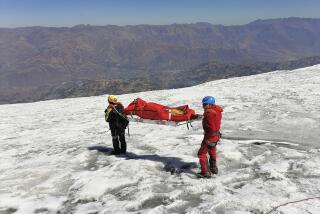Review: Exquisite ‘Sherpa’ tells of climbing Everest from the guide’s point of view

Director Jennifer Peedom of the film, “Sherpa,” is photographed in the L.A. Times photo studio at the 2015 Toronto International Film Festival.
- Share via
Anyone eager to see a stirring film set on Earth’s highest peak is in luck: Just bypass “Everest” and go directly to “Sherpa,” a documentary whose visual magnificence is more than matched by unforgettable characters and political urgency.
The exquisitely crafted film is a much-needed corrective to prevailing Western-focused views of Himalayan mountaineering, views that turn the local people — the Sherpas without whom foreigners couldn’t make their bragging-rights climbs — into bit players with no lines.
Director Jennifer Peedom set out to explore Mt. Everest’s thriving commercial-expedition industry from the perspective of the Sherpas, an ethnic group from Nepal. The 2014 climbing season that she and her hardy crew were covering turned out to be like no other, with 16 Nepalese guides killed in an avalanche. The surviving guides, united in their grief and anger, took a stand that left its own reverberations.
SIGN UP for the free Indie Focus movies newsletter >>
The film’s compelling central figures are Phurba Tashi Sherpa, a revered record-holding guide, and New Zealand native Russell Brice, whose expedition outfit employs Tashi. Though they cooperate in the aftermath of the devastating accident, they do so across a cautiously negotiated divide that’s fascinating to behold. The filmmakers are keenly attuned to not only the extraordinary natural setting but also the human drama unfolding around them.
Another climber, long deceased, casts a mighty shadow in the story Peedom tells: Tenzing Norgay, the Sherpa who summited Everest with Edmund Hillary in 1953, inspiring generations of Nepalese to follow in his snow boots. One of his daughters recalls her father’s eventual regret. He believed that Chomolungma, as the Sherpas call Everest, was punishing him. It’s a sacred place in their culture, not a territory to be conquered.
The conquering continues, even as Sherpa self-determination sets new limits. If this elitist sport gives rise to an international circus in a holy spot, it’s also the basis of an economy. Because they need the money, Sherpas trek up and down the treacherous Khumbu Icefall, its dangers intensified by climate change, to cart creature comforts for clients who shell out as much as $100,000 for the experience. Observers struggle to find a moral justification. Perhaps Tashi’s father puts it best. “What’s the point,” he asks, “of everyone going up the mountain?”
--------------------------
“Sherpa.”
No MPAA rating.
Running time: 1 hour, 36 minutes.
Playing: Laemmle’s Playhouse 7, Pasadena.
MORE:
‘Labyrinth of Lies’’ hunt for Nazis: Compelling topic, clunky approach
‘Stonewall’ tries but shortchanges pivotal gay rights moment
‘The Intern’ is a Nancy Meyers comedy, for better or worse
More to Read
Only good movies
Get the Indie Focus newsletter, Mark Olsen's weekly guide to the world of cinema.
You may occasionally receive promotional content from the Los Angeles Times.










